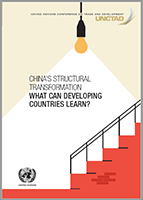
Over the past four decades, China has achieved remarkable economic growth, lifting millions out of poverty and meeting major international development goals, contributing significantly to the 2030 Agenda for Sustainable Development. In the process China has transformed itself from a global assembly hub to a global digital leader.
- What is the policy story behind China’s “economic miracle”?
- What strategies lie behind its successful integration into the global economy?
- What kind of reference point can it offer to other developing countries through South-South policy experience sharing?
This volume sets out to provide some answers to these questions through a series of studies on the Chinese “economic miracle”. It focuses on several complementary policy areas that provide key insights in explaining the rapid growth trajectory of China, namely, macroeconomic and
finance, industrial development, international trade and the digital economy.
The book has greatly benefited from the discussions that took place in the two international workshops held in Beijing and Jakarta in 2019 and several webinars organized under the project in close cooperation with partner organizations including China’s Development and Research Center (DRC), China’s Academy of International Trade and Economic Cooperation (CAITEC),Indonesia’s Institute for Development of Economics and Finance (INDEF), Ethiopia’s Policy Study Institute (PSI) and Sri Lanka’ Information and Communication Technology Agency (ICTA), with the participation of key actors from the public institutions, academia and the private sector.
This book contributes to the existing literature on China’s structural transformation. It also provides developing countries with an important learning opportunity on policies that can help them progress towards the sustainable development goals.
The volume has been prepared in the framework of the project titled “South-South Integration and The SDGs: Enhancing Structural Transformation in Key Partner Countries of the Belt and Road Initiative” funded by UNPDF Sub-Fund for SDG. The project is being implemented by the Division of Globalization and Development Strategies of UNCTAD since 2018 and aims at encouraging peer-learning.
Richard Kozul-Wright
Director, Division on Globalization and Development Strategies
UNCTAD


